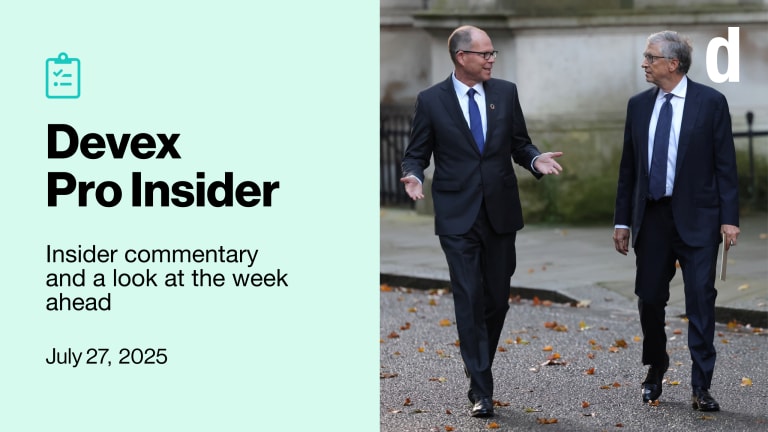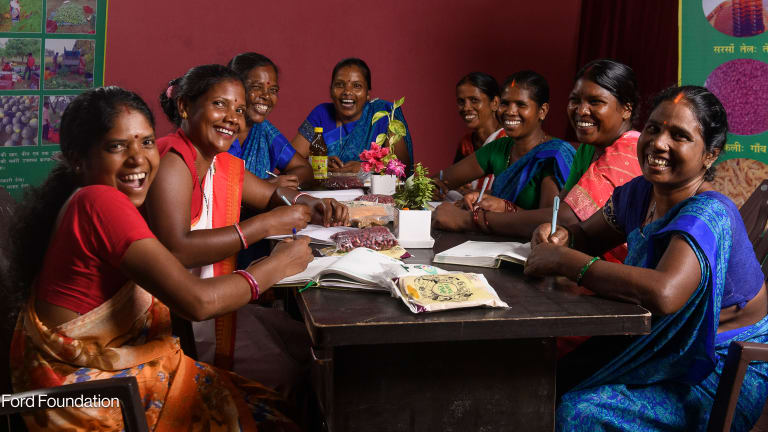Inside Melinda French Gates’ $1 billion 'incredible experiment'
After breaking from the Gates Foundation, the philanthropist is investing $1 billion to advance women’s rights — but this time, Melinda isn’t the one calling the shots.
Sabrina Habib was at the Heathrow Airport just outside London when she got the email. After a nine-hour flight from Nairobi, Habib held her toddler while staring at her phone. She had received a message from Melinda French Gates, who asked if Habib — the co-founder of Kenya’s largest childcare network, Kidogo — would like $20 million to disburse to other organizations across the world. “I was trying to read the email, process it, and juggle my daughter at the same time,” Habib told Devex. “She was like: Mummy, mummy, mummy! And I was like: Just one second, just one second!” Habib got on her second flight to Toronto, had a follow-up call after landing, and immediately accepted the offer. Now, Habib is one of 12 individuals charged with sharing French Gates’ money with others whose work they find most effective, on top of 16 organizations that have been given unrestricted funding to support women and girls worldwide. The philanthropist’s only ask to those individuals — from former New Zealand Prime Minister Jacinda Ardern to Afghan education activist Shabana Basij-Rasikh — was that they “direct the money to organizations doing urgent, impactful, and innovative work to improve women’s health and well-being,” according to a newsletter released by French Gates’ philanthropic investment company, Pivotal Ventures. “It’s an incredible experiment,” Habib said. “And I hope one that can be followed. This approach could really redefine how we do philanthropy and how we can put power into things that don’t always get the spotlight.” Same focus, new twist Earlier this week, French Gates announced she was investing $1 billion into those pushing for women's and girls’ rights across the globe. It came two weeks after she resigned from the Bill & Melinda Gates Foundation, and three years after splitting from her former husband and foundation co-chair, Bill Gates. As part of her separation agreement from the Gates Foundation, the philanthropist received $12.5 billion to channel toward her own philanthropy, a sum that French Gates said she intends to commit to her work “on behalf of women and families.” And now, the first set of those dollars has hit the banks. “For too long, a lack of money has forced organizations fighting for women’s rights into a defensive posture while the enemies of progress play offense,” wrote French Gates in a New York Times op-ed published Tuesday. “I want to help even the match.” For those following the 59-year-old philanthropist, her focus on women and girls was nothing new. French Gates has been at the forefront of issues such as reproductive health care, female empowerment, and women’s rights for more than two decades — first through the Gates Foundation, and then through Pivotal Ventures, which she founded in 2015 to invest in women-led funds and early-stage companies. But what is new, experts told Devex, is French Gates’ grantmaking approach. The majority of French Gates’ new funding is unrestricted, a style of grantmaking that historically the Gates Foundation has shied away from. Now, French Gates seems to be leaning into “trust-based” philanthropy and allowing organizations — and individuals — to give and spend money as they choose. Of an initial $690 million disbursement from French Gates, $200 million is being channeled toward 16 entities working on such issues in the United States, such as the Center for Reproductive Rights, the Collective Future Fund, and the National Women’s Law Center. Another $240 million have been split across 12 individuals including Habib. And later this year, an additional $250 million will go toward global grassroots groups focused on women’s mental and physical health. According to French Gates, that funding will be directed to organizations “beyond the reach of major funders” through an open call. The remaining $310 million of French Gates’ $1 billion commitment will be determined in the months to come, a Pivotal spokesperson told Devex. “It was a pleasant surprise to see not only the unrestricted giving, but the sharing of the wealth and the influence,” said Jacqueline Ackerman, the interim director of the Women’s Philanthropy Institute, a research institution within the Indiana University Lilly Family School of Philanthropy. “It’s really indicative of someone who wants to use her influence without burdening the beneficiaries of her generosity too much, and allowing them to just do the work.” No strings attached Many of the 16 organizations French Gates is now funding — such as the Brooklyn-based Ms. Foundation for Women — are grantmaking organizations themselves. In its latest annual report, the foundation stated it had partnered with organizations in 35 states and 83 cities, 97% of which were led by women and girls of color. This new surge of funds will create a ripple effect, experts explained, with philanthropic dollars going into different hands. “To create change, philanthropy needs to do more than shift resources. It also needs to shift power,” said Pamela Shifman, the president of the Democracy Alliance and founder of Shake the Table, two U.S.-based organizations. “As Melinda sets her own agenda, she’s moving millions of resources to other women to set theirs.” That’s especially true when it comes to moving money to 12 individuals, Shifman said, and allowing them to choose which organizations they felt would make the most impact with additional resources. Each individual’s funds will be managed by National Philanthropic Trust, an independent public charity that manages donor-advised funds, a Pivotal spokesperson told Devex. The trust will help those selected with their grantmaking processes, and “support any research, landscaping, and additional information needed to identify and recommend organizations they believe will have an impact on improving women’s health and well-being.” “I’m eager to see the landscape of funding opportunities through their eyes, and the results their approaches unlock,” wrote French Gates in the New York Times op-ed. For Lee Badgett, the chief economist of LGBTI+-focused research lab Koppa, that means tapping into what she’s researched for years: Economic inequality among LGBTI+ people across the world. For Gary Barker, who heads the applied research organization Equimundo, that means drawing on his expertise in engaging men and boys in gender equity work. And for Crystal Echo Hawk, who founded IllumiNative to change the narrative around Native Americans, that means focusing on the issues that affect Indigenous women most: From a lack of access to health care to the epidemic of missing and murdered women and girls. “There’s a logic to it, especially if you’re thinking about reaching deeply into communities where smaller organizations can make a big difference,” Badgett told Devex. “Those of us who are working in all these different fields are going to be able to see things that would not be so obvious.” While up to $5 million can be given to organizations the individuals are affiliated with, the bulk of the money needs to be distributed externally, members of the group told Devex — and they have until December 2026 to do so. “This allows us to turn up the volume, and to engage with partners with whom we’ve been thinking big for a long time,” said Barker. Moving the needle It’s this type of approach that could give French Gates’ investments a lasting impact, Ackerman said. “If [French Gates] is using her resources and her networks and her audiences to spur more giving and longer-term giving — and more focus on women and girls across the U.S. and around the world — that’s what’s going to be the game changer,” said Ackerman. “The money makes a difference. But it doesn’t make the difference.” Organizations focused on women and girls receive 1.8% of charitable giving across the United States, a figure accounting for just $8.8 billion in 2020, according to the Lilly Family School of Philanthropy’s latest Women & Girls Index. That’s less than half of what the country spent on arts and culture-related philanthropy in the same year — and for subsets within that group, the dollar count gets even smaller. Just 35 cents of every $100 in foundation funding goes toward organizations focused on LGBTQ+ issues, the Global Philanthropy Project found, despite steep increases in such funding over the last decade. Partly, that’s due to the fact that many organizations can’t access philanthropic dollars in the first place, Echo Hawk said. “I’m not a program officer at a philanthropic organization, but I’ve worked in my community my entire life,” said Echo Hawk. “I know my community, and I know where people are. And [this style of grantmaking] says: This expertise is vitally needed.” While grassroots groups may be doing critical work in their communities, they often don’t have the time or resources to jump through the hoops set up by professional philanthropists, Echo Hawk said. Now, she’s hopeful French Gates’ influence could change that — and perhaps, lead to a shake-up across the philanthropic sector. “This is really saying: I’m transferring the assets, I’m standing back, and I’m trusting people, their communities, and their networks to say what’s important here,” said Echo Hawk. “I think it’s long overdue for us to look at new ways of doing this.”
Sabrina Habib was at the Heathrow Airport just outside London when she got the email.
After a nine-hour flight from Nairobi, Habib held her toddler while staring at her phone. She had received a message from Melinda French Gates, who asked if Habib — the co-founder of Kenya’s largest childcare network, Kidogo — would like $20 million to disburse to other organizations across the world.
“I was trying to read the email, process it, and juggle my daughter at the same time,” Habib told Devex. “She was like: Mummy, mummy, mummy! And I was like: Just one second, just one second!”
This story is forDevex Promembers
Unlock this story now with a 15-day free trial of Devex Pro.
With a Devex Pro subscription you'll get access to deeper analysis and exclusive insights from our reporters and analysts.
Start my free trialRequest a group subscription Printing articles to share with others is a breach of our terms and conditions and copyright policy. Please use the sharing options on the left side of the article. Devex Pro members may share up to 10 articles per month using the Pro share tool ( ).
Elissa Miolene reports on USAID and the U.S. government at Devex. She previously covered education at The San Jose Mercury News, and has written for outlets like The Wall Street Journal, San Francisco Chronicle, Washingtonian magazine, among others. Before shifting to journalism, Elissa led communications for humanitarian agencies in the United States, East Africa, and South Asia.








